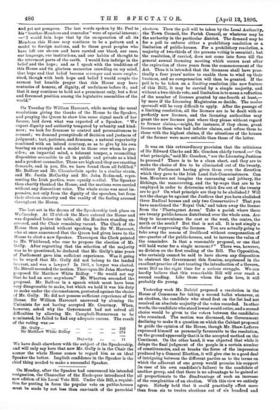It was on this extraordinary provision that the criticisms of
Sir Edward Clarke and Mr. Goschen chiefly turned `• On what principle," said Mr. Goschen, " are the Licensing Justices to proceed P There is to be a clean sheet, and they are to make the choice of five to be eliminated out of the twenty, without Parliament having given them even the direction which they gave to the Irish Land Sub-Commissioners. Can hon. Members not imagine the canvassing and jobbery, the filchings, the manoeuvring, and the by-ways that are to be employed in order to determine which five out of the twenty are to go ? On what principle are they to be abolished ? Will not the charge be against the Justices that you have abolished three Radical houses and only two Conservative ? That you have sanctioned the ' Royal Oak,' and taken away the license from the ' Plantagenet Arms.' Take a parish where there are twenty public-houses distributed over the whole area. Are they to inconvenience the east or the west, the centre, the north or the south ? But that is not alL It is not simply a choice of suppressing the licenses. You are actually going to take away the means of livelihood without compensation of one-quarter of the public-houses, and to increase the value of the remainder. Is that a reasonable proposal, or one that will hold water for a single moment ? " There was, however, no division on the first reading of the Bill. The Opposition, who certainly cannot be said to have shown any disposition to obstruct the Government this Session, acquiesced in the excellent practice of not treating the introduction of a Govern_ went Bill as the right time for a serious struggle. We can hardly believe that this remarkable Bill will ever reach a second reading. Like those whom the gods love, it will probably die young.


































 Previous page
Previous page